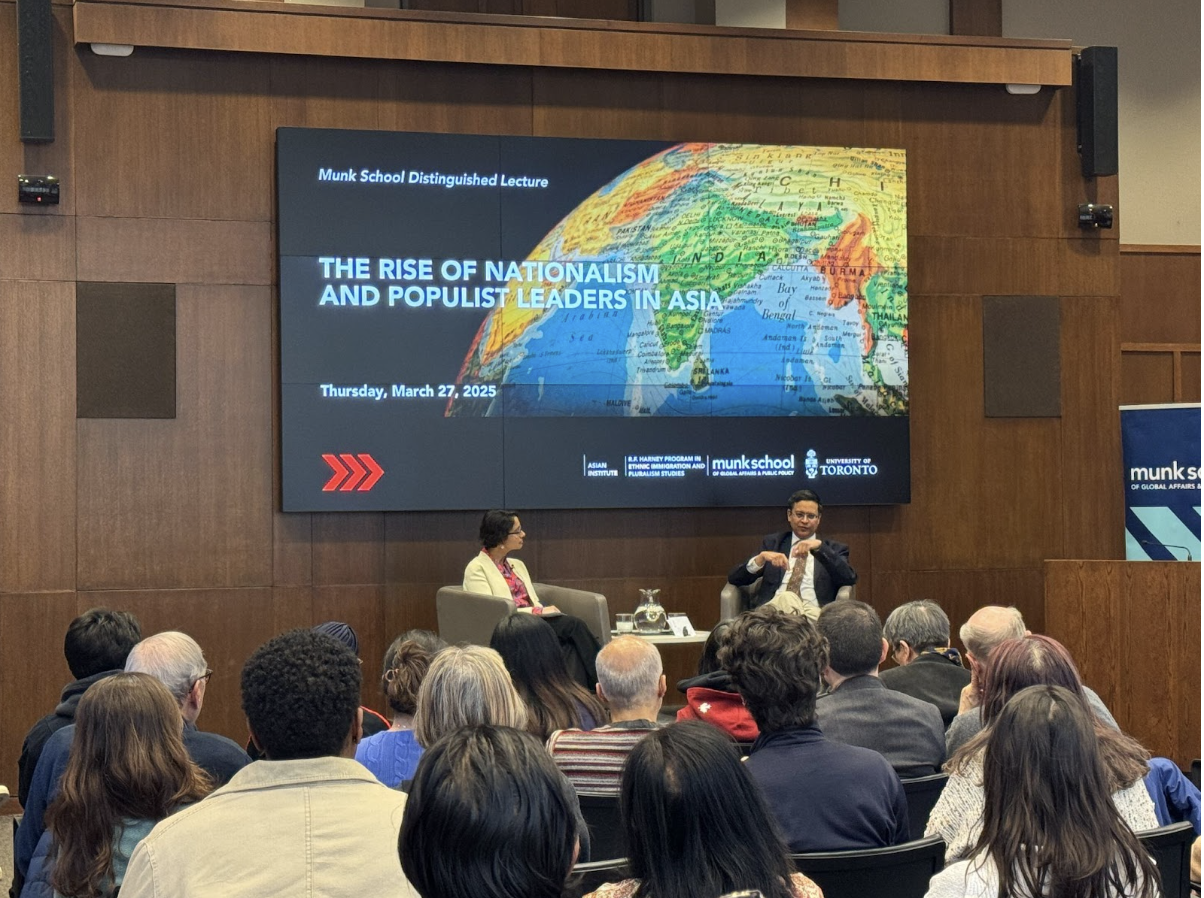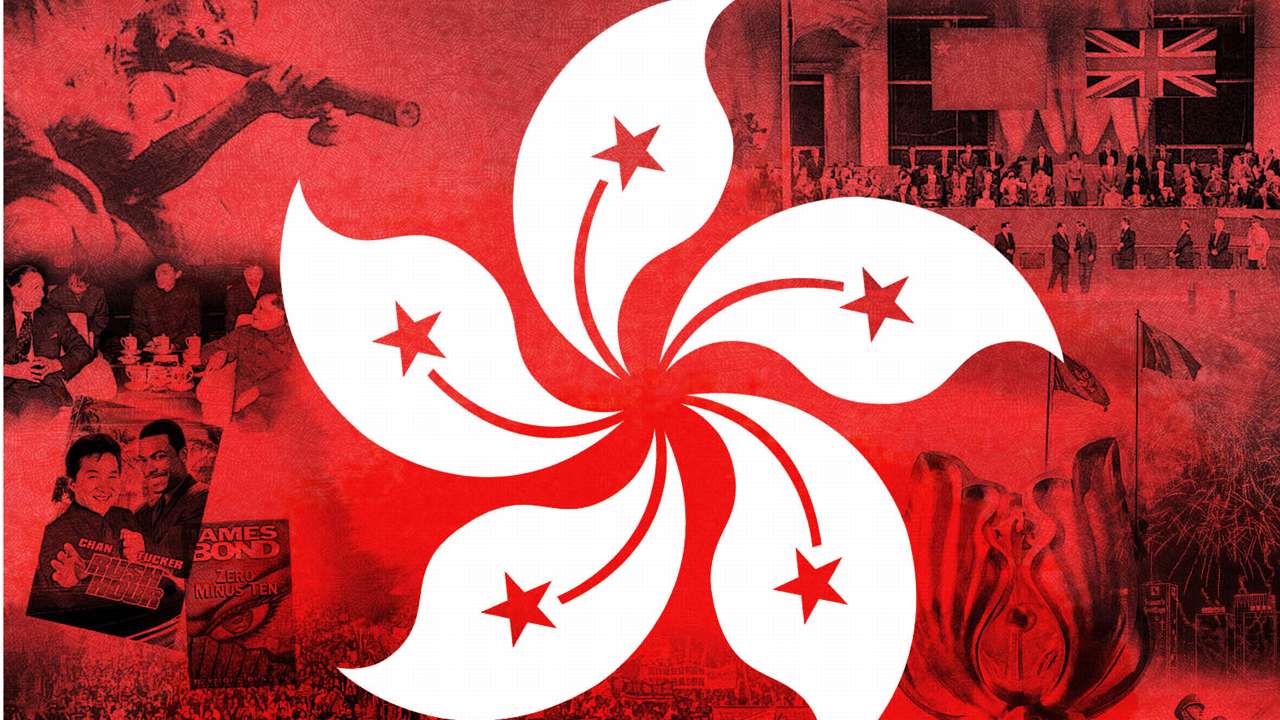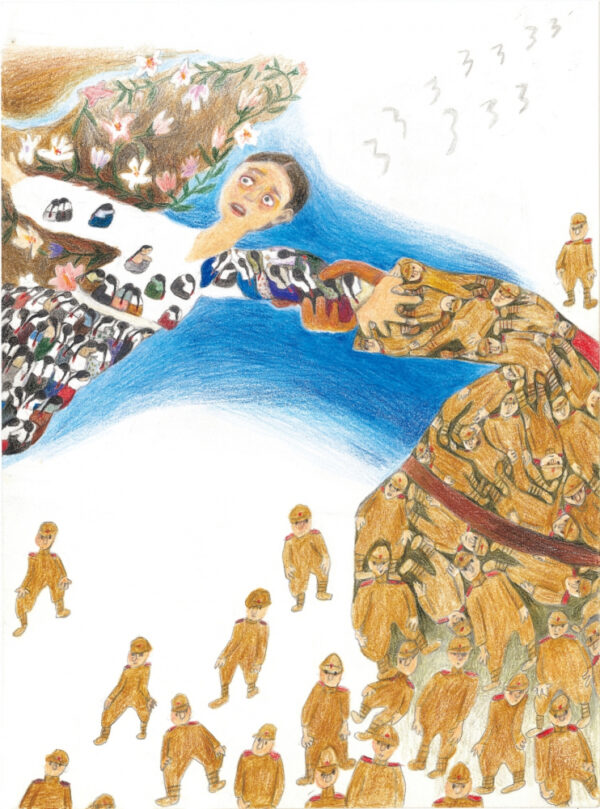This Event was covered by both our East Asia event reporter, Brandon Zhang, and our South Asia event reporter, Hamza Noor. Both highlight different aspects of the event pertaining to their relevant region. You can find Brandon’s report here.
On March 27, 2025, a lecture entitled ‘The Rise of Nationalism And Populist Leaders In Asia’ was held at Campbell Conference Facility at the Munk School of Global Affairs and Public Policy. The event was sponsored by the Munk School in partnership with the Asian Institute and the R. F. Harney Program in Ethnic, Immigration and Pluralism Studies at the Munk School. The lecture was initially planned to feature Professors Jennifer Gandhi, Rana Mitter, and Manjari Chatterjee Miller, however, it was announced at the beginning of the lecture that Professor Gandhi would not be attending due to a bereavement in family. Professor Gandhi is a professor in the Department of Political Science and the Jackson School of Global Affairs at Yale University, and her research focuses on authoritarian regimes, elections, and political institutions. Professor Mitter is ST Lee Chair in US-Asia Relations at the Harvard Kennedy School, specialising in modern Chinese history and politics. Professor Miller, who chaired the lecture, is a professor of international relations and the inaugural Munk Chair in Global India at the Munk School, with expertise on India, China, and rising powers. The theme of this lecture was to explore the recent rise of populist nationalism in Asia, focusing on how it manifests through political rhetoric, state actions, and digital platforms, in China and India under the leadership of Xi Jinping and Narendra Modi, while also examining the broader implications of strong nationalist leadership in both countries.
Professor Manjari Chatterjee Miller began the conversation by asking Professor Rana Mitter to reflect on what China can teach us about the rise of authoritarianism, nationalism, and populism. In his response, Professor Mitter highlighted the influential role of media, especially television, in capturing the mood and character of a society. He referenced the Chinese TV programme When Marx Met Confucius, in which the figures of Karl Marx and Confucius engage in a debate about whether their seemingly opposing philosophies can be reconciled. According to Professor Mitter, this contradiction, referred to in Chinese as máodùn, sits at the core of Chinese nationalism today. Under Xi Jinping’s leadership, he noted, the state promotes the narrative that these two ideological traditions can coexist in harmony, unified through Xi’s vision.
Professor Mitter went on to identify another enduring contradiction at the heart of Chinese nationalism today, the tension between China’s imperial past and its ongoing transition into a modern nation-state. As China still grapples with its imperial legacy and identity marked by diverse ethnicities, complex hierarchies, and fluid notions of territoriality, Professor Mitter argued that the project of nation-building in China is still a “work in progress”.
Turning to the specific brand of nationalism being promoted under Xi Jinping, Professor Mitter outlined four key factors underpinning it. First is the powerful memory of the “Century of Humiliation”, a period of foreign invasion and subjugation which continues to shape national identity. Second is the idea of economic performance legitimacy, in which political and civil liberties are often subordinated to the promise of economic growth. Third is a renewed embrace of pre-modern Chinese philosophies, particularly Confucianism. And fourth is the ideological foundation of Marxism-Leninism, which remains central to the Communist Party’s self-image.
Professor Miller then posed further questions about the nature of nationalism in Xi Jinping’s China, prompting additional insights from Professor Mitter. He noted a key distinction between Xi and his predecessors was Xi’s active embrace of pre-modern Chinese culture, particularly Confucianism. The blending of traditional Chinese philosophy with Marxism-Leninism, Professor Mitter emphasised, is a distinctly Xi-era development.
Professor Mitter also observed that the Chinese state is working to construct a moral narrative about itself on the global stage, portraying China as a responsible power, for instance through its leadership in green energy transition, though he noted that this claim is open to debate. Domestically, a form of moral nationalism is also at play, where the restriction of individual rights and freedoms for the achievement of economic and social welfare goals is framed as morally justified and necessary trade-off.
Turning to the challenges facing this nationalist vision, Professor Mitter pointed to growing public disillusionment, particularly in the wake of the COVID-19 pandemic. The crisis, he argued, exposed perceived shortcomings in the system’s ability to respond effectively. Furthermore, with slowing growth and rising macroeconomic difficulties, the state’s promise of prosperity in exchange for political compliance appears increasingly fragile. He also highlighted the emergence of feminist movements as a further challenge, particularly in the context of official narratives around masculinity promoted by the state.
Afterwards, the floor was opened for questions from the audience, most of which centred on further dimensions of nationalism in China. In response, Professor Mitter noted that ethno-nationalism has become an increasingly prominent feature of Chinese nationalism, with non-Han identities, such as those of the Uyghurs and Mongols, being downplayed or marginalised. Building on this point, Professor Miller observed that while the BJP in India is also advancing a form of ethno-nationalism, India’s landscape is shaped by multiple competing nationalisms, including linguistic, caste-based, and anti-elite nationalisms, each of which intersects and competes with the ethno-nationalist narrative.
Professor Mitter also reflected on China’s evolving relationship with its borders, noting that the country, in its transition from an imperial past, is increasingly behaving like a bordered nation-state, having moved towards resolving long-standing border disputes, and now appears more comfortable with a modern territorial identity. In contrast, Professor Miller remarked that nationalism in South Asia has not always been territorial. She pointed out that Jinnah’s nationalism was initially framed around religion, the idea being that the Muslim League would represent Muslims and the Congress would represent Hindus in a shared central government. The emphasis on territorial nationalism and Westphalian sovereignty, she argued, emerged much later in the region’s political development.
Although brief mentions and comparisons with India arose during the final Q&A segment, the discussion remained largely focused on China, likely due to the absence of Professor Gandhi, which shifted the emphasis more squarely onto Professor Mitter’s area of expertise, that is China.
Hamza Noor is a fourth-year undergraduate student at the University of Toronto, majoring in International Relations with minors in Political Science and Near & Middle Eastern Civilizations. Born and raised in Pakistan, Hamza is deeply interested in the region and his research interests include the impact of nuclear deterrence on India-Pakistan conflict dynamics, the evolution of proxy warfare in South Asia, and the political economy of the China-Pakistan Economic Corridor (CPEC) and its regional implications.








